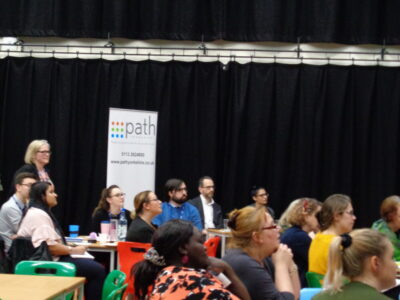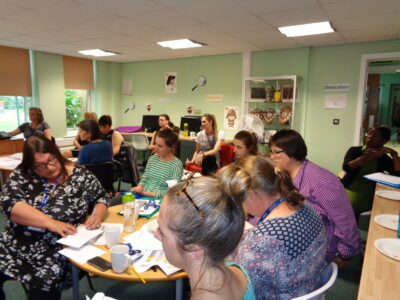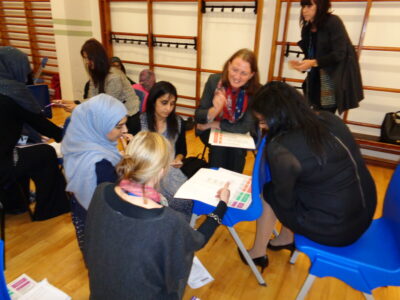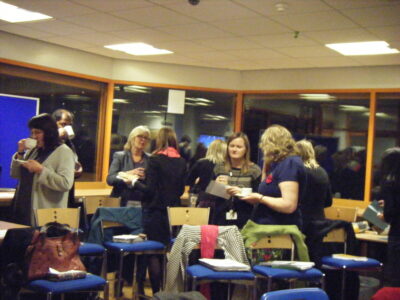RIGs & SIGs Coordinators share their experience
NALDIC RIGs are learning communities, bringing together primary and secondary colleagues, local authority advisors, researchers and supporters to share ideas and insights about EAL. Warm and welcoming, they are fantastic groups who are there to help with queries and challenges and to celebrate successes! And NALDIC SIGs have developed in response to requests from members who want to raise the profile of EAL and bilingualism in a specific area of interest. There are currently 5 active Special Interest Groups: EAL Coordinators, Newcomers and Refugees, Early Years, Independent schools, and International schools SIGs.
Dianne Excell on Regional Interest Groups (RIG)
Have you ever wished you’d never started something? When there was a discussion about ‘refreshing’ the Regional Interest Groups (RIGs) at the NALDIC General Council Meeting in March 2012, I didn’t realise that two years later I would be coordinating the RIGs and trying to increase the number at the 2016 annual conference in Sheffield or that in Spring 2023 (at way past retirement age) I would be convening the 32nd Yorkshire and the Humber RIG – but I will be!
How did it begin?
By 2012, the once ring-fenced Ethnic Minority Achievement Grant (EMAG) which allowed Local Authorities to support and train practitioners to teach pupils learning English as an additional language (EAL) was no longer available. EAL services were reduced or ruthlessly deleted, changes to Initial Teacher Training meant that often new teachers were not adequately prepared to teach EAL learners in their classrooms whilst, at the same time, the number of pupils with EAL was increasing year on year. As a consequence, there was an urgent need for continuing professional development (CPD) for all professionals in the field. NALDIC realised this was an opportunity to build on its network of RIGs to support colleagues in different contexts in different regions, which could potentially increase NALDIC membership.  Steve Cooke offered to convene a RIG in the Midlands and, being a strong advocate for the excellent practice I had seen further ‘up North’, I decided to grasp the nettle to try to establish a RIG for Yorkshire and the Humber. I enlisted the help of my friend and ex-colleague, Jean Conteh, to convene our first RIG at the University of Leeds in October 2012. Sixteen practitioners attended from Local Authorities (LA), schools and Universities and we got to know each other by sharing our specific concerns and interests in EAL and what we could offer as support in future RIGs. I remember one colleague commenting, ‘What a great idea. This is bound to grow.’ By the spring term 2013 it DID when 25 practitioners attended RIG 2 at the University of York and at some RIGs, 50 attended.
Steve Cooke offered to convene a RIG in the Midlands and, being a strong advocate for the excellent practice I had seen further ‘up North’, I decided to grasp the nettle to try to establish a RIG for Yorkshire and the Humber. I enlisted the help of my friend and ex-colleague, Jean Conteh, to convene our first RIG at the University of Leeds in October 2012. Sixteen practitioners attended from Local Authorities (LA), schools and Universities and we got to know each other by sharing our specific concerns and interests in EAL and what we could offer as support in future RIGs. I remember one colleague commenting, ‘What a great idea. This is bound to grow.’ By the spring term 2013 it DID when 25 practitioners attended RIG 2 at the University of York and at some RIGs, 50 attended.
Y&H is a very large region but before the Covid-19 pandemic struck, 23 RIGs had been convened in venues across the region from Harrogate to Hull and Grimsby to Sheffield, generously hosted for free by RIG members. After building such an enthusiastic network, when the lockdowns made face-to-face meetings impossible, we continued meeting online via Zoom.
 By 2016 RIGs were only convened in North and South London, West Midlands and Y&H so, at the Sheffield conference, I found myself encouraging colleagues to consider convening a RIG in their region. As a result South Wales, Oxford and Berkshire and Hampshire had convened inaugural RIGs by the end of 2016. They were joined in 2017 by Kent, Southwest, East Midlands and Northeast – an amazing 200% increase! Cumbria joined the network later.
By 2016 RIGs were only convened in North and South London, West Midlands and Y&H so, at the Sheffield conference, I found myself encouraging colleagues to consider convening a RIG in their region. As a result South Wales, Oxford and Berkshire and Hampshire had convened inaugural RIGs by the end of 2016. They were joined in 2017 by Kent, Southwest, East Midlands and Northeast – an amazing 200% increase! Cumbria joined the network later.
What are the challenges?
Our convenors are all volunteers so when, for various reasons, they can no longer convene, it has not always been possible to recruit another convenor – hence vacancies continue to exist in South Wales, Oxfordshire and Cumbria and soon we may lose South and North London. The pandemic also meant that several RIGs were unable to convene because of increased workloads. A major challenge for me, as a dinosaur and technophobe, was learning to Zoom! I am, therefore, grateful that Nandhaka Pieris or Lee Allan have always been there to facilitate for me.
What about the joys?
 The buzz during and after every meeting from the willingness of colleagues to share their research and good practice which will support less experienced practitioners; the enthusiasm of LA colleagues who have freely shared advice that could have been ‘traded services’; the ability now to attend most RIG meetings virtually and to welcome colleagues from places as far away as Seville and Gdansk!
The buzz during and after every meeting from the willingness of colleagues to share their research and good practice which will support less experienced practitioners; the enthusiasm of LA colleagues who have freely shared advice that could have been ‘traded services’; the ability now to attend most RIG meetings virtually and to welcome colleagues from places as far away as Seville and Gdansk!
Some feedback
“Rigs are successful because they involve practitioners with expertise in all areas of EAL.”
“We found the RIG highly inspiring: there was lots of food for thought and it was wonderful to meet such highly competent and enthusiastic practitioners and researchers.”
“What a fantastic, enjoyable and incredibly friendly event. I loved every bit of it and I certainly didn’t mind travelling 80 miles there and back to attend. Great networking opportunities too. The RIG was brilliant – such an eye-opener and broadening of my horizons. I can’t wait for the next RIG.”
So… I am so pleased that I did ‘start something’ back in 2012 after all!
Eowyn Crisfield on the Special Interest Groups (SIG)
 The network of Special Interest Groups (SIGS) was a positive outcome of the COVID crisis. As the RIGS meetings were moved online, they were drawing attendees from all over the UK and abroad. The networks were enhanced by the wider participation, but at the same time it became more difficult to cater to large groups with varying interests. A clear way forward was to create SIGS based on area of interest rather than geographical area, and to have them remain online permanently. NALDIC already had two named SIGS, for International Schools and Independent Schools, but their only activity was a Facebook page for sharing of links and key information. We decided to add in termly online meetings for these SIGs, and to develop other key areas. So far, we have created SIGs for EAL Coordinators, Early Years, Refugees and Newcomers, and are in the process of developing one for Gypsies, Roma, and Travellers. Each SIG is run by a team of volunteers, who have all worked very hard over the last year to get things off the ground. We would welcome additional volunteers to support the SIG convening teams, so if this is an area you would like to be involved in, please do join the SIGs via the website using the sign-up link. You do not need to be a NALDIC member to join a SIG or to offer your support to the convening team. Looking forward to seeing many of you at our online meetings this year!
The network of Special Interest Groups (SIGS) was a positive outcome of the COVID crisis. As the RIGS meetings were moved online, they were drawing attendees from all over the UK and abroad. The networks were enhanced by the wider participation, but at the same time it became more difficult to cater to large groups with varying interests. A clear way forward was to create SIGS based on area of interest rather than geographical area, and to have them remain online permanently. NALDIC already had two named SIGS, for International Schools and Independent Schools, but their only activity was a Facebook page for sharing of links and key information. We decided to add in termly online meetings for these SIGs, and to develop other key areas. So far, we have created SIGs for EAL Coordinators, Early Years, Refugees and Newcomers, and are in the process of developing one for Gypsies, Roma, and Travellers. Each SIG is run by a team of volunteers, who have all worked very hard over the last year to get things off the ground. We would welcome additional volunteers to support the SIG convening teams, so if this is an area you would like to be involved in, please do join the SIGs via the website using the sign-up link. You do not need to be a NALDIC member to join a SIG or to offer your support to the convening team. Looking forward to seeing many of you at our online meetings this year!

